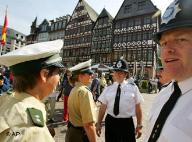World Cup in Review: How Did Germany Score?
While Germany came out in third place on the field, international security and safety experts gave the country a winning score for organizing the 2006 World Cup.
From the day Germany was awarded the 2006 World Cup until the final whistle, the country's organizing committee stressed that orchestrating the world's biggest soccer tournament would not be an easy task.
Just less than three months after the last penalty shoot-out, experts gathered at the 2006 European Congress on Disaster Management in Bonn, to discuss the security and communication strategies put in place for the Cup.
Safety was in the spotlight during the month-long tournament with nearly 3 million soccer fans spread across the country and organizers facing a number of major security challenges including potential disease outbreaks, hooliganism and terrorism.
Communication challenges
A terrorist attack was at the top of the list for possible dangers, said Elmar Rüther, project leader for the North Rhine-Westphalia Criminal Police Office.
Rüther said the most important lesson taken from the World Cup was the need to coordinate efforts on an international scale well-before an event begins.
Strategies to promote good communication were successful, according to the panel reviewing the World Cup.
 Liaison officers from federal and state agencies, including police forces from across Europe, armed forces and fire departments, were designated to ease the exchange information.
Liaison officers from federal and state agencies, including police forces from across Europe, armed forces and fire departments, were designated to ease the exchange information.Terrorist attacks foiled
There was an attempted terrorist attack, which was thwarted by the presence and efficiency of the security forces, according Heiko Löhr, project leader for the Federal Criminal Police Office.
An investigation found suspected terrorists from Lebanon wanted to strike during the World Cup soccer finals, which ran from June 9 to July 9 but changed their minds due to the risks and repercussions their act could have triggered, the Westdeutsche Allgemeine Zeitung reported.
Hooliganism deterred
Despite 450 arrests and 2,000 blacklisted fans, there were no major outbreak of fan violence or hooliganism.
 "The high visibility of police officers was a deterrent for hooligans," Rüther said.
"The high visibility of police officers was a deterrent for hooligans," Rüther said.He added that security forces were "always in the right place" to prevent altercations from breaking out.
The English fan mile in Cologne
For the Cologne fire department, the Sweden versus England game in Cologne, which attracted huge numbers of supporters, was a massive effort.
The fire department chief Stephan Neuhoff said previous experience from a papal visit in 2005 helped organization ahead of the World Cup.
"The planning was okay because the experiences we gained from the Cologne Youth Day," he said. "We learned to respond to large amounts of people moving quickly and suddenly.
"We knew once the English team was gone that things would settle down," he added.
The English supporters had their own camping space at an old shipyard that was set up with projector screens, drinking areas and gave the supporters a chance to hang their flags and banners.
A large number of the 50,000 Swedish fans also wanted to camp, and grounds were set up for them in Aachen, the fire chief said.
"We secured rescue routes and corridors for the medical teams," Neuhoff said. "There were forces available immediately to respond to anything that happened."
Armed forces: World Cup is not our job
Though German law kept them off the streets, the armed forces had to be available for emergency situations and provided ''decontamination units, tracker dogs and removing of debris and for traffic management," said Colonel Henry Newman.
"In total there were 275,000 man-hours put into the World Cup by the defense forces," he said. "The ministry made the defense forces available due to the circumstances of the World Cup -- however, it is not an everyday responsibility for us."
Rachel Ryan
Deutsche Welle 09/2006

0 Comments:
Post a Comment
<< Home